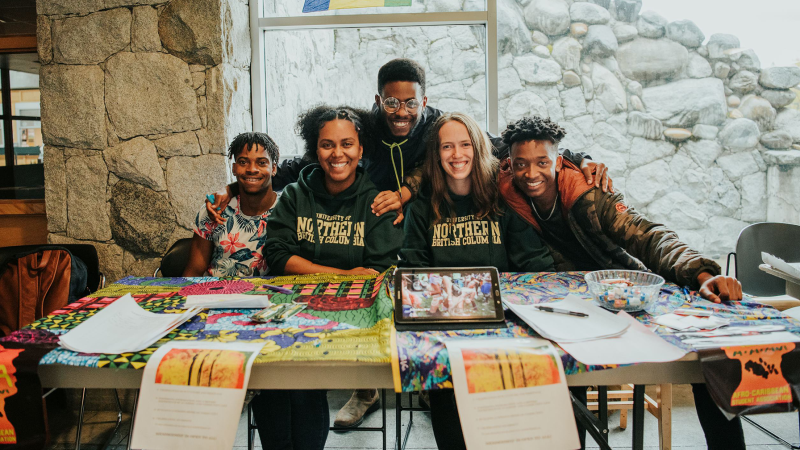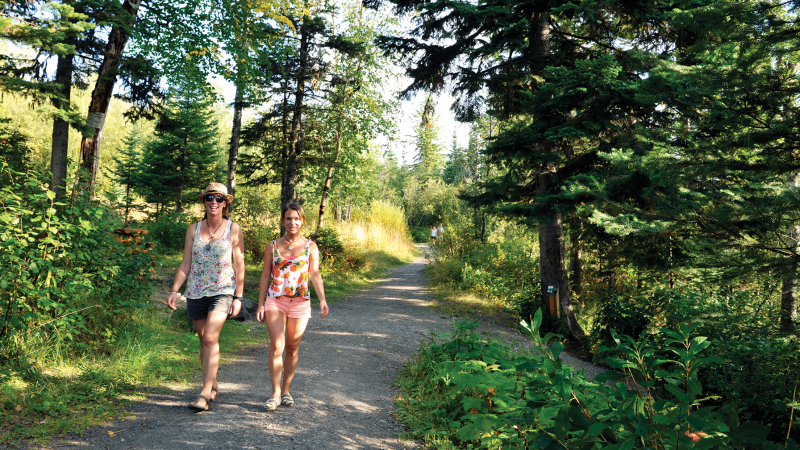Digital Viewbook
- House of Learning
- UNBC's motto: 'En Cha Huná
- About UNBC
- Faculty of Business and Economics
- Faculty of Environment
- Faculty of Human and Health Sciences
- Faculty of Indigenous Studies, Social Sciences and Humanities
- Faculty of Science and Engineering
- Division of Medical Sciences
- Canada's Green University™
- Campuses
- Connect with your community
- UNBC Residence: Neyoh and Keyoh and you
- Plenty of food options on campus
- Student life and support
- Easy access to active living
- Run as One: UNBC Timberwolves
- Take your learning beyond the classroom
- Community-focused research with global impact
- Put your degree to work
- Finances and scholarships
- Become a UNBC student
- Leaders of tomorrow
- Experience UNBC
- Glossary: University lingo
House of Learning
Welcome to the University of Northern British Columbia. We are also known by our Dakelh (Carrier) name, Nizdeh Nekeyoh Hohudel’eh Baiyoh, which translates to “House of Learning”.
Pronounced Niz-day Nay-Kay-yo Ho-Hah-del-eh Buy-yo
Elders and representatives of the Lheidli T’enneh First Nation, the nation on whose land our Prince George campus is situated, gifted us this name in recognition of UNBC’s key educational role in traditional Lheidli T’enneh territory.
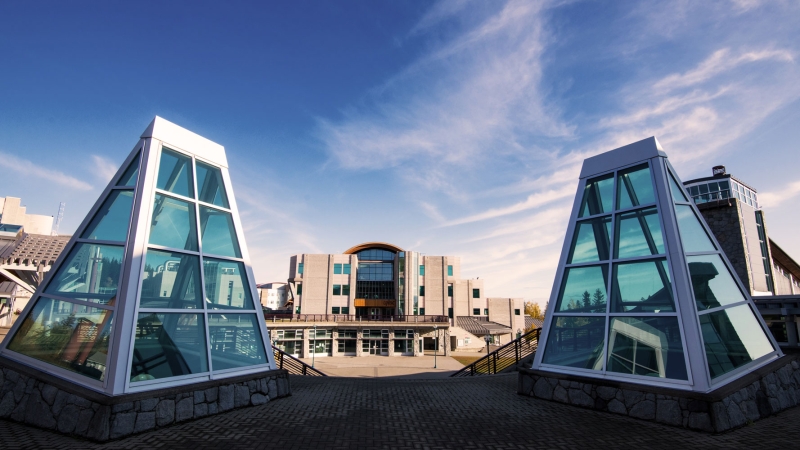
Since time immemorial, Indigenous Peoples have walked gently on the diverse traditional territories where the University of Northern British Columbia community is grateful to live, work, learn, and play. We are committed to building and nurturing relationships with Indigenous Peoples, we acknowledge their traditional lands, and we thank them for their hospitality.
Our Prince George campus is situated on the unceded traditional territory of the Lheidli T’enneh First Nation. Our South-Central campus in Quesnel is situated on the unceded traditional territories of the Lhtako Dené Nation, Nazko First Nation, Lhoosk’uz Dené Nation, and ?Esdilagh First Nation. Our Peace River-Liard campus in Fort St. John is situated in Treaty 8 territory on the traditional lands of the Dane-zaa peoples of the Doig River First Nation, Blueberry River First Nation, and Halfway River First Nation. The Northwest campus in Terrace is situated on the unceded traditional Tsimshian territory of the Kitsumkalum First Nation and Kitselas First Nation. Our satellite campus in Prince Rupert is situated on the unceded traditional Tsimshian territory of the Lax Kw’alaams Band and Metlakatla First Nation.
UNBC has a federated agreement with the Wilp Wilxo’oskwhl (House of Wisdom) Nisg̱a’a Institute (WWN). Established by the Nisg̱a’a Lisims Government in 1993 and situated on Gitwinksihlkw Village Lands within Nisg̱a'a Treaty territory, WWN is a fully-accredited university-college serving all people in northwestern British Columbia.
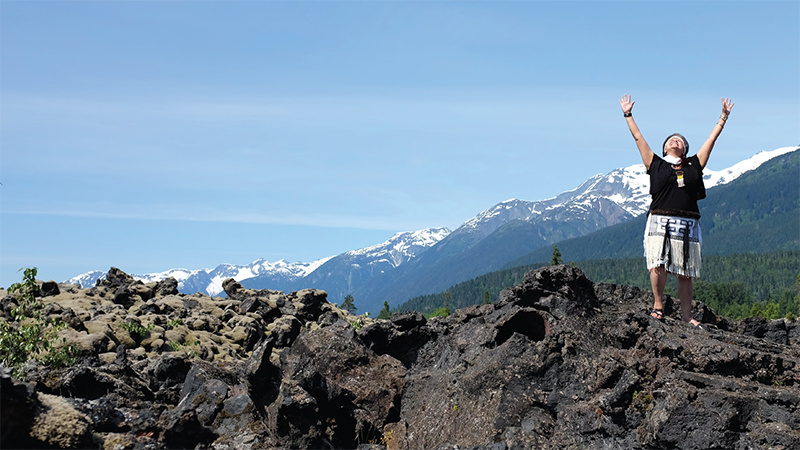
Apply to UNBC
'En Cha Huná
UNBC's motto, from Dakelh (Carrier) Elders, reminds us that all people have a voice and a viewpoint. Interpreted as "respecting all forms of life", 'En Cha Huná encapsulates the spirit of academic freedom, respect for others, and willingness to recognize different perspectives.
About UNBC
UNBC's Mission: To inspire leaders for tomorrow by influencing the world of today.

- 3,500+ undergraduate students
- 735+ graduate students
- 1:5 faculty and staff-to-student ratio for student support
- 1,827 total courses offered
- 50+ student clubs
- 299 days of sunshine in Prince George
Maclean's Magazine University Rankings 2022 (Primarily Undergraduate Category)
- #1 in Canada in 2022.
- #1 in Western Canada for student satisfaction.
- #1 in Western Canada for mental health services.
- 1:14 faculty-to-student ratio and the best faculty-to-student ratio in Western Canada .
Times Higher Education World University Rankings 2022
- Ranked in the top 250 young universities worldwide (1 of only 3 from Canada)
Diversity statistics
- 12% Indigenous students
- 11% International students
- Students from more than 60 countries
Degree programs
- 62 Bachelors
- 29 Masters
- 3 PhDs
First-year class sizes
- Average first-year class size: 62
- Arts: 42
- Science: 83
- Health Sciences: 84 | Labs: 26
- Commerce: 62
- Planning: 68
- Engineering: 66 | Labs: 26
Faculty of Business and Economics
The Faculty of Business and Economics is where you can access a well-rounded degree in Commerce and Economics through an active and inclusive learning environment that advances your knowledge of contemporary issues and practical skills that apply to today’s business world.
Our professors and instructors explore a vast array of research interests, which they bring to the classroom, contributing to your advanced understanding of business and the economy. We are committed to the success of our students through the development of management knowledge, business practice, and the exploration of modern theory and applied research that enables you to reach your full potential as a global citizen and leader in your organization and community.
Where do you want to go with your degree?
- Auditing and accounting
- Bank manager
- Business analyst or systems analyst
- Company treasurer
- Economic development officer
- Entrepreneurship, business ownership or business management
- Financial analysis and financial management
- International trade or international business
- Investment banking or financial planning
- Marketing, market research, advertising and brand management
- Project management
- Research analyst for government, non-profits, or non-governmental organizations
- Stockbroker
Further study
- Chartered Professional Accountant program
- Graduate school
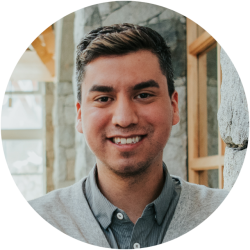 Jared Nome, Prince George, B.C., Lheidli T’enneh First Nation, BComm Marketing
Jared Nome, Prince George, B.C., Lheidli T’enneh First Nation, BComm Marketing
“My degree gave me the well-rounded business education I need to apply my skills to the companies I work for in the real world. I am able to think radically and offer business solutions that are needed to succeed in our changing and vibrant market and economy. Your time at UNBC can allow you to develop your critical thinking and understanding of the many theories you will study.”
Faculty of Environment
The Faculty of Environment includes world-renowned scientists, scholars, staff, students, alumni, and community collaborators and supporters all dedicated to impactful teaching, research, engagement, and making
a difference at the forefront of environmental issues in the North and across the world.
The multi-faceted problems we address, discoveries we make, innovative solutions we create, and the inspiration and skills we learn and instill in others provide the foundation for us to face society’s urgent challenges.
Our graduates develop key interdisciplinary skills, experience, and perspectives leading to careers in consulting, academics, industry, government, and other areas that increase in demand every year as we navigate the environmental changes we face and opportunities for positive change they pose.
Where do you want to go with your degree?
- Community development or community planning
- Conservation biologist
- Education
- Environmental consultant
- Land and resource management
- Natural resource planning or First Nations planning
- Outdoor educator
- Public interest groups or nongovernmental organizations
- Research scientist
- Tourism management or entrepreneurship
Further study
- Graduate school
- Law school
- Medicine or medical research
- Veterinary school
- Education
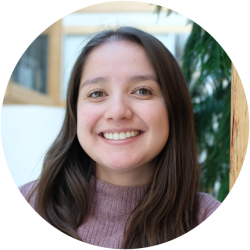 Rachelle Foubert, Mackenzie, B.C., Saik’uz First Nation, BSc Wildlife and Fisheries
Rachelle Foubert, Mackenzie, B.C., Saik’uz First Nation, BSc Wildlife and Fisheries
“My degree is providing me with the qualifications, education, and skills needed to work with people and professionals. There are numerous hands-on learning experiences and undergraduate research opportunities, and the faculty are supportive. They are always finding ways to improve the student experience through unique teaching methods and resources.”
Faculty of Human and Health Sciences
The Faculty of Human and Health Sciences consists of faculty and students who are dedicated to the improvement, advancement, and delivery of health care, human and community health services, and education on a local, regional, and global scale. Our suite of programs prepare students for a rewarding career in the health, education and social work sectors.
We embrace our role as leaders in human and health sciences education and research at Canada’s best small university. Our small class sizes encourage close connections with faculty and the opportunity to share in their passion for teaching and research on a personal level. Our programming is both socially and environmentally responsive. We actively pursue new ways of bringing engaging research and hands-on, practical learning to the classroom and beyond.
Where do you want to go with your degree?
- Addictions or crisis counsellor
- Clinical social worker
- Corrections
- Educator
- Family support and outreach
- Health care management
- Hospital administrator
- Nurse educator
- Public health administrator
- School social worker or counsellor
- Registered nurse
Further study
- Education
- Graduate school
- Law school
- Pharmacy school
- Dentistry school
 Zoe Kore, Prince George, B.C., BHSc Biomedical Studies
Zoe Kore, Prince George, B.C., BHSc Biomedical Studies
“The sense of community at UNBC was something I really enjoyed. It felt like everyone was in it together and rooting for each other’s success, which may not be as apparent within larger universities. There are also more chances to interact one-on-one with professors and create meaningful connections.”
Faculty of Indigenous Studies, Social Sciences and Humanities
We are committed to fostering foundational human disciplines. Our faculty serve the diverse communities of northern British Columbia through relevant, creative, innovative, and curiosity-driven teaching and research.
We believe that social and cultural diversity is core to enriching your learning experience. The confluence of diversity and respectful discussion stimulates creative thoughts, new ways of thinking, and new pathways of inquiry. Our programs encourage the development of critical, intellectual, and practical knowledge that is essential to your post-secondary and professional pursuits.
Where do you want to go with your degree?
- Anthropologist or archaeologist
- Band manager
- Communications
- Court services
- Counselling and community development
- Economic development
- Forensic scientist
- International development, humanitarian relief, refugee support
- Non-governmental leadership and/ or policy development
- Public administration for municipal, provincial and federal levels
- Publishing
- Forensic scientist
- Museum curator or archivist
- Research and policy analysis
Further study
- Education
- Graduate school
- Journalism
- Law
- Library science and museology
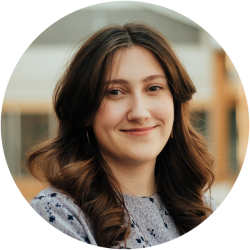 Lydia Kinasewich, 100 Mile House, B.C., BA History
Lydia Kinasewich, 100 Mile House, B.C., BA History
“I have grown as a student and a person. UNBC is very community-oriented and fosters an environment that aims to leave students feeling comfortable and supported.
Nothing challenges my thinking and pushes me to consider new perspectives like History. The program is very close-knit, which provides students with exciting opportunities.”
Faculty of Science and Engineering
Welcome to the Faculty of Science and Engineering, where design and innovation meet the world of science and mathematics. Our passion is the pursuit of knowledge of the natural world and the discovery of sustainable solutions to problems facing society.
Our programs are designed to develop your fundamental knowledge and practical skills as you develop as a community leader in your chosen field. We are committed to the values of experiential learning and discovery through hands-on learning and undergraduate research initiatives that hone your skills and knowledge.
One of our main goals is to bring science and engineering to a more diverse population in northern B.C. As part of Canada’s Green University, our research and courses encompass many aspects of sustainability, environmental restoration, natural products and technologies to protect the environment.
Where do you want to go with your degree?
- Biochemist, natural products chemist, biochemistry technician
- Civil, environmental, geo-technical, transportation, municipal, or water resource engineer and consultant
- Chemist, chemical technician,
- forensic scientist
- Computer programmer, software developer, IT specialist, web and mobile application developer
- Mathematician, statistician, data analyst, actuary, economist
- Physicist, physics technician, entrepreneur, inventor
Further study
- Graduate school
- Medicine or medical research
- Pharmacy school
- Veterinary school
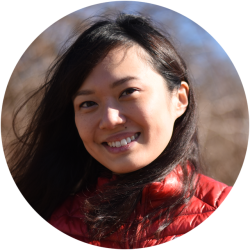 Jessica Chan, Richmond, B.C., BASc Environmental Engineering
Jessica Chan, Richmond, B.C., BASc Environmental Engineering
“I love that UNBC offers such a dynamic learning environment. My degree allowed me to explore a variety of subjects and career sectors, not just engineering. My coursework included forestry, ecology, environmental science, and others, which enabled me to explore interests important to me.”
Division of Medical Sciences
Our programs are focused on providing education in the areas of medical science and rehabilitation, including human biology and movement, anatomy, pathology, clinical skills, disease prevention, diagnosis and treatment, and wellness. We provide opportunities for students interested in pursuing medical, physical therapy and occupational therapy education to study and train for these professions in the North.
The Division of Medical Sciences delivers University of British Columbia (UBC) education programs in partnership with UNBC, and also supports post-graduate training in various UBC medical residency programs in northern B.C. We strive to provide our learners with an outstanding education that includes an in-depth perspective on rural health care.
Where do you want to go with your degree?
- Medical research
- Medicine (with career options across a wide variety of medical specialties)
- Occupational therapy
- Physical therapy
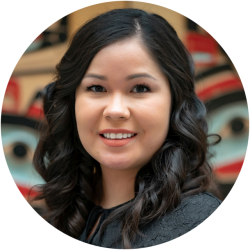 Tarissa Alec, Takla Landing, B.C., Takla First Nation, BHSc Biomedical Studies and the UBC Northern Medical Program
Tarissa Alec, Takla Landing, B.C., Takla First Nation, BHSc Biomedical Studies and the UBC Northern Medical Program
“UNBC allowed me to attend university and pursue a medical education without disrupting my family. It also allowed me to remain close to my traditional Indigenous territories.
The UBC Northern Medical Program specifically allowed me to foster relationships with local and surrounding communities. It allowed me to better understand the unique health disparities that these communities face so that I can better serve them in the future.”
Canada's Green University™
Social responsibility and strategic priority
We honour our environment with our teaching and research; initiatives led by our students, faculty and staff; and campus architecture.

As Canada’s Green University™, UNBC is committed to minimizing its environmental impact and operating costs by reducing energy consumption through energy efficiency projects, student and staff engagement, and energy awareness campaigns.
- Carpooling program
- UNBC’s Bioenergy Plant reduces 85% of the annual fossil fuel emissions it would take to heat the Prince George campus
- Package-free bulk foods store on campus
- UNBC is a Fair Trade Campus
- Secure, covered bike storage; stand-alone bike lockers; a bike repair station and shower facilities
- The Green Fund provides grants for innovative projects to create a more sustainable campus
Campuses
- Prince George campus
- Northwest campus - Terrace, B.C. and Prince Rupert, B.C.
- South-Central campus - Quesnel, B.C.
- Peace River-Liard campus - Fort St. John, B.C.
- Wilp Wilxo’oskwhl Nisga’a Institute - Gitwinksihlkw, B.C.
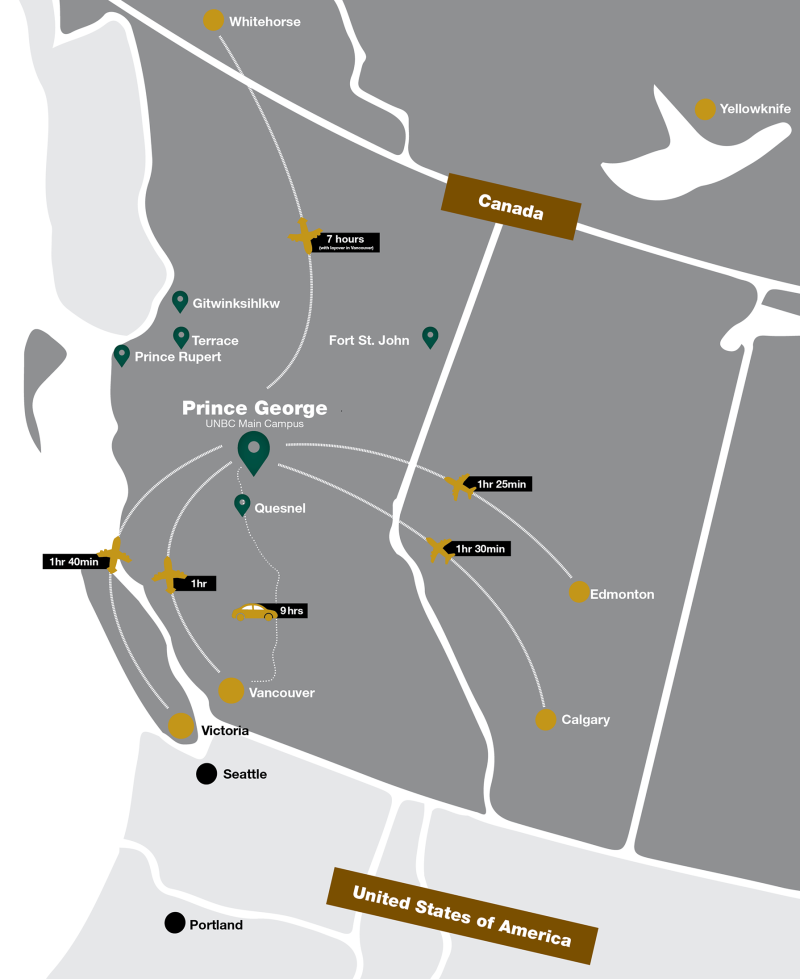
Connect with your community
Get to know Prince George
UNBC’s Prince George campus is located on the traditional territory of the Lheidli T’enneh First Nation, whose name means “people where the rivers come together” in the Carrier language.
Prince George is the hub of northern B.C. You will find plenty of local restaurants, shopping, live music, and nightlife. Prince George is big enough to offer you access to all the amenities, culture, arts, and entertainment you would expect from a major city, but small enough that you will feel at home and connected to your community.
Prince George is an affordable city to earn your degree, begin a career or business, and make your home.
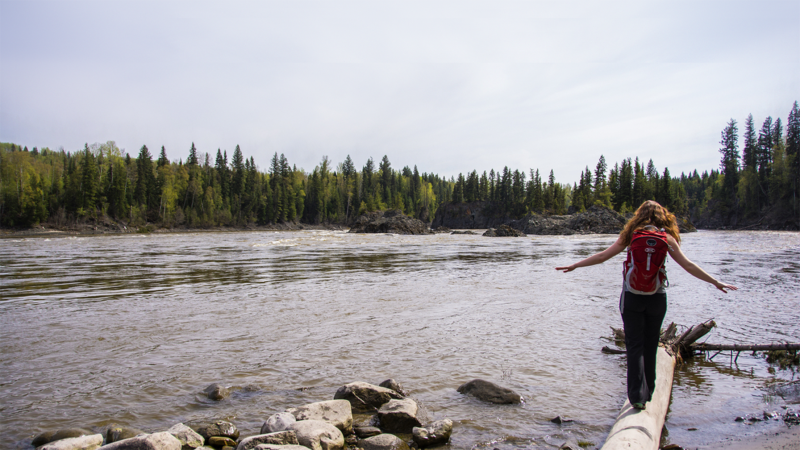
Cost of living comparison ( CA$ per month)
- Prince George: $1,985
- Calgary: $2,480
- Victoria: $2,710
- Vancouver: $3,305
Features of surrounding areas
- 11.9 square km of parks
- 1,200 lakes within an 80 km radius
- 5 ski hills within 200 km
Average daytime temperatures
- Winter: -8ºC
- Spring: +16ºC
- Summer: +25ºC
- Fall: +8ºC
Learn more about Prince George
- Tourism Prince George website
- Tourism Prince George on Instagram
- Northern B.C. Tourism on Instagram
- Move Up Prince George on Instagram
Neyoh and Keyoh and you
More than just a place to live, UNBC Housing is a thriving community!
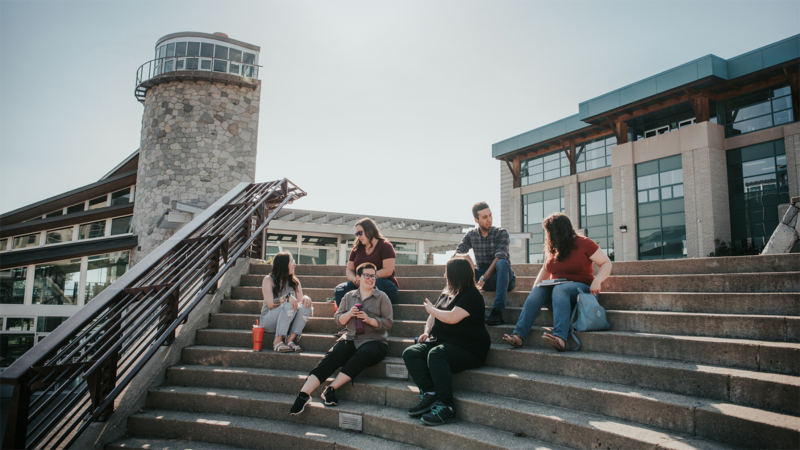
UNBC’s two residence buildings are respectfully named after Dakelh terms—Neyoh translates to “our home” and Keyoh translates to “our community".
Our Residence Assistants (RAs) help build community and provide student support through educational and social programming. Each floor of Housing has two RAs. We also have specialty RAs: an Indigenous Focus RA, two Academic RAs, two International Focus RAs, a Wellness and Engagement RA, and a Sustainability and Outdoor Education RA.

*Sample suite layout. Not all suites feature the same configuration.
Did you know?
You can choose from five different floor options:
- Standard
- Green
- Academic-intensive
- All-female
- Mature (21 and over)
Safe, supportive and inclusive
- Private, card-secured bedrooms
- Furnished 4-bedroom apartment-style suites
- Shared kitchen, bathroom and living spaces in each suite
- Student Housing is just 5 minutes away from the heart of campus
Easy access to everything you need
- Public transportation
- Northern Sport Centre
- On-campus support
- Fresh dining
- Biking and walking trails
- 24-hour security
On-campus Housing
Rental cost comparison per academic year (does not include mandatory meal plan fees)
| Minimum rental cost | Maximum rental cost | |
|---|---|---|
| UNBC | $5,205 | $5,205 |
| SFU | $6,545 | $15,840 |
| UVic | $3,760 | $13,090 |
| UBC-O | $5,610 | $9,475 |
| UBC | $3,800 | $16,640 |
Off-campus Housing
Average rental cost for 1-bedroom per academic year
- Prince George: $9,000
- Burnaby: $15,080
- Victoria: $17,000
- Kelowna: $15,600
- Vancouver: $19,600
Plenty of food options on campus
Visit the Agora Dining Hall, student-run coffee shop, or Good Earth Coffeehouse.
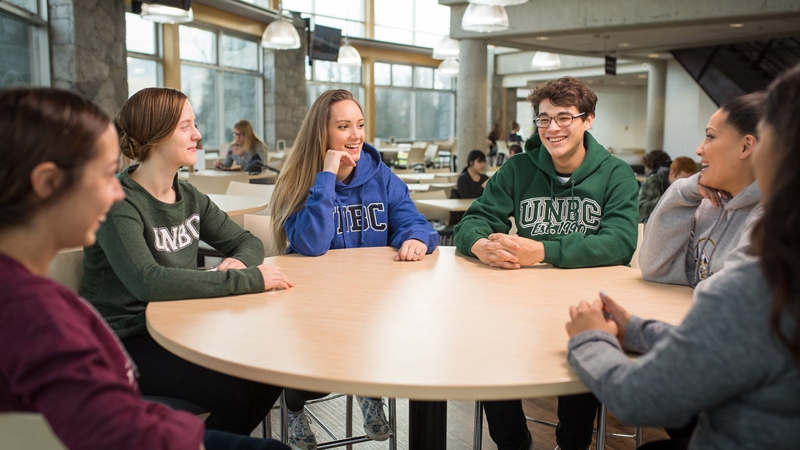
The 7-Day and 5-Day Meal Plans are all-you-care-to-eat options in the Agora Dining Hall. Ask a chef to assemble your own meal and let us do the cooking with fresh and tasty items hot off the grill.
Our on-site Executive Chef creates a menu daily with appetizing entrées and snack features, made-from-scratch desserts, hearty homemade soups, salads and more. The Agora Dining Hall is a showcase of natural light, open seating and a great place to connect with friends.
Which UNBC Meal Plan applies to students who live on campus?
If you have less than 60 UNBC credit hours you must select a mandatory 5-Day or 7-Day Meal Plan with Dining Dollars.
If you are a graduate student or if you have more than 60 hours of course credits and you eat on campus regularly, you can choose one of the following:
- 7-Day Meal Plan with $150 of Dining Dollars
- 5-Day Meal Plan with $150 of Dining Dollars
- 50-Meal Deal
If you are a graduate student or if you have more than 60 hours of course credits but you do not eat on campus regularly, you can choose one of the following:
- 10-Meal Deal
- 20-Meal Deal
Students on the 7-Day Meal Plan have full access to the Agora Dining Hall every day.
Students on the 5-Day Meal Plan have access to the Agora Dining Hall from Monday to Friday.
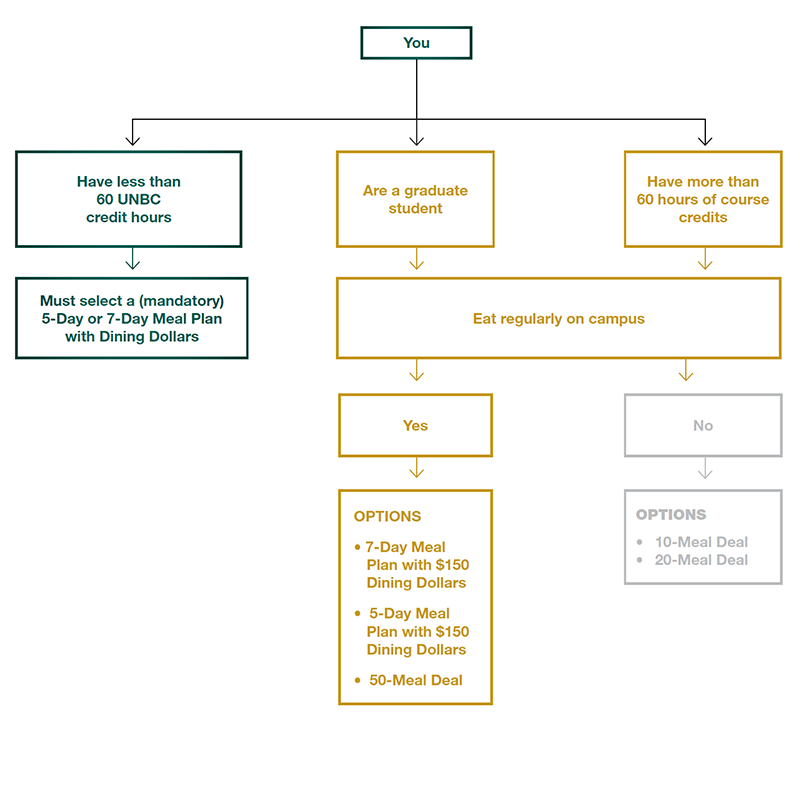
Student life and support
Ranked #1 in Western Canada for mental health services 6 straight years - Voted by students, Maclean's Magazine, Primarily Undergraduate category
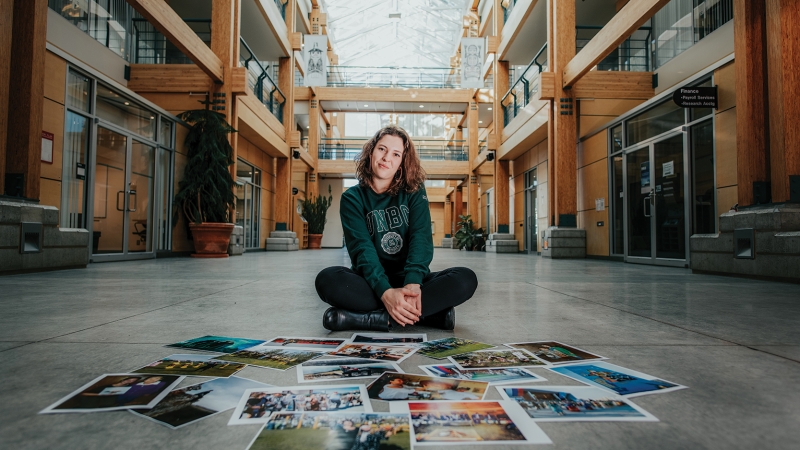
Learning opportunities
- Small class sizes
- Undergraduate research
- Study abroad
- Academic supports
- Academic Success Centre
Social life
- On-Campus cafés
- Student-led clubs
- On-campus pub
- Student societies
- Intramural sports
- Timberwolves Athletics
Connection to nature
- Provincial parks
- City trails
- Nearby lakes
- Hiking
- Biking
- Skiing
- Snowshoeing
Career support
- Co-op
- Research
- Internships
- Field schools
- Career Centre
- Employer networking
Community support
- Women’s Centre
- Pride Centre
- Counsellors
- First Nations Centre
- Wellness Centre
Safe campus
Easy access to active living
High-performance sport facility right on campus
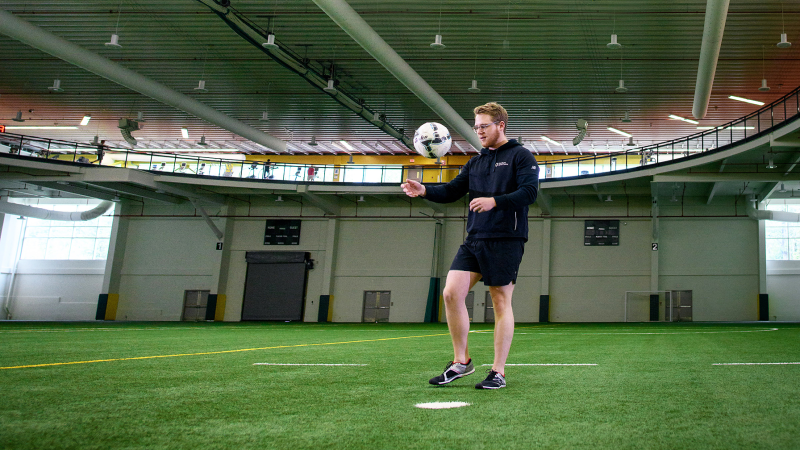
The Charles Jago Northern Sport Centre at our Prince George campus is one of the most impressive sport and recreation facilities in B.C. It is a 145,000 square foot, high-performance sport facility equipped with an elevated running track, modern fitness equipment, full-sized basketball court and FIFA-approved indoor soccer turf.
Membership is included in your student fees.
- Intramural and drop-in sports
- Certified personal training
- Fit Camp, Zumba and Yoga classes
- 2 squash courts
- 3 gymnasiums
- 2 indoor soccer fields
- 280-metre 3-lane indoor track
- 6 cardio and strength training fitness zones
- 50 hours a week of drop-in fitness and recreation
- Free drop-in group fitness classes
Run as One: UNBC Timberwolves
The UNBC Timberwolves varsity basketball and soccer teams compete at the highest level of university sport in the country, as part of the Canada West conference of U SPORTS.

The TWolves are exceptional student-athletes in the classroom, while displaying tremendous leadership in northern B.C. and their communities.
Perennially among the most-attended games in Western Canada, the Timberwolves continue to set the green and gold standard at UNBC. The basketball teams play their home games at the Charles Jago Northern Sport Centre and the soccer teams play their home games at Masich Place Stadium. #RunAsOne
- 2 soccer teams
- 36 Timberwolves home games
- 2 basketball teams
Take your learning beyond the classroom
34 study abroad options in 18 countries

Experiential learning and discovery is at the heart of UNBC’s core values. We encourage every opportunity for students to learn from the world around them. Through various fields school and exchange programs, you can hone your skills in real-life settings, put learning into action, and participate in life-changing opportunities.
Field schools
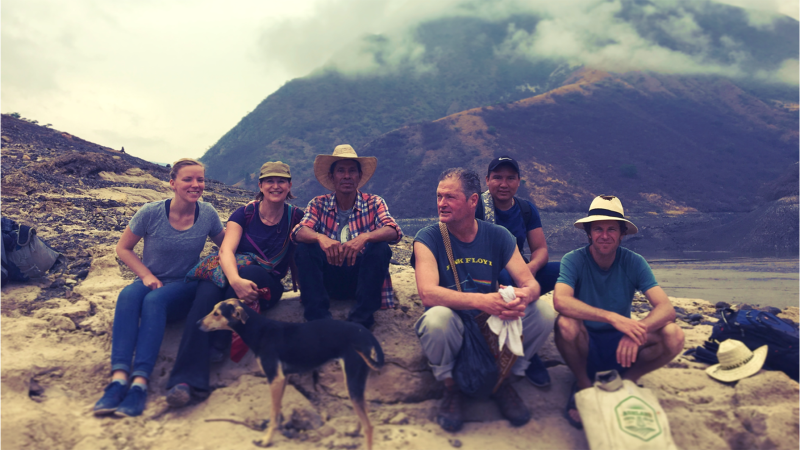
Imagine travelling to Guatemala to learn from and work with local Indigenous communities, or taking on the role of a political leader in a simulation about the impacts of climate change, or maybe you are touring the Rockies to study snowpacks. Across the University, field schools are specifically designed for you to apply your knowledge and reflect on your learning inside and outside the classroom.
Study abroad
UNBC's Exchange Program offers UNBC students a chance to travel and study at an international university for the cost of a semester's tuition and fees. UNBC has partnership agreements with 34 institutions in 18 different countries and we often add new schools and countries.
Community-focused research with global impact
A Top 50 Canadian Research University
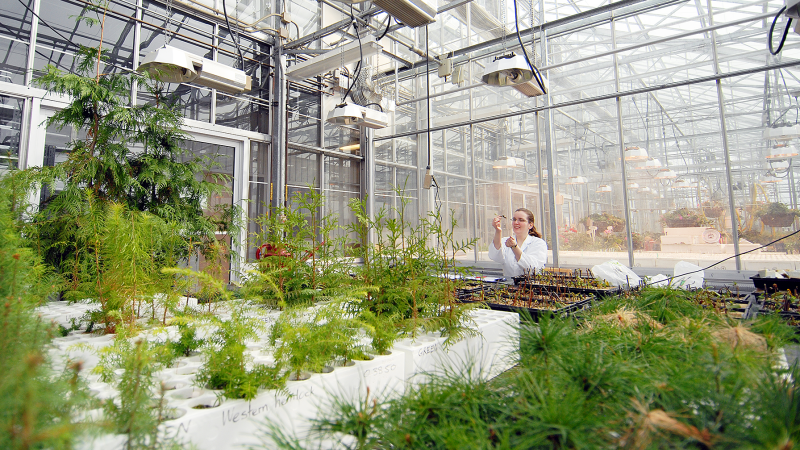
As one of B.C.’s research-intensive universities, we bring the excitement of new knowledge to our students, and the outcomes of our teaching and research to the world. In addition to fostering and celebrating academic excellence, UNBC is a welcoming place, with a learning environment that is friendly, inclusive, and supportive. Students at every level are provided access to research opportunities.
- Participate in groundbreaking research as early as your first year
- 1 of 4 original research-intensive Universities in B.C.
Meet a Research Ambassador
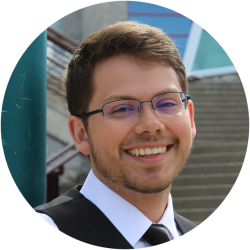 Julian Stokes, New Hazelton, B.C., Haida Nation, BHSc and MHSc
Julian Stokes, New Hazelton, B.C., Haida Nation, BHSc and MHSc
“I am continually amazed by the readily accessible opportunities, mentorship, and sense of community at UNBC. Having had the opportunity to experience life, classes, and research as part of UNBC, it was the natural choice to further my education here.
Research was an irreplaceable part of my undergraduate experience, and my only regret is that I did not get involved sooner. Research at UNBC has been an incredible learning experience that has helped me expand my horizons and feel as though my work is making a meaningful contribution.”
Put your degree to work
Why Co-op?
Gain practical, paid work experience while completing your degree. UNBC Co-operative Education is your connection to the professional world. Through UNBC’s co-op programs, you can apply the skills you learn in the classroom to the workplace and build invaluable connections with local and regional employers.
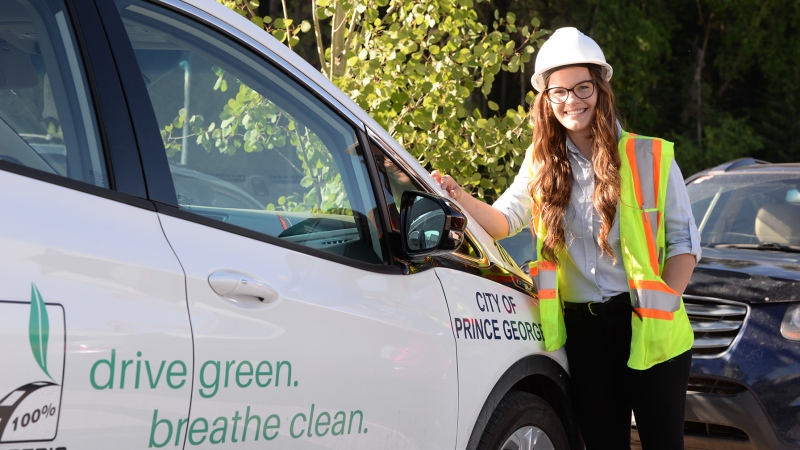
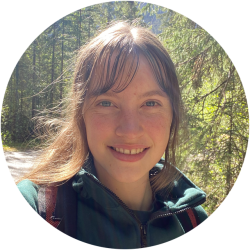 Grace Koehler, High River, Alta., BSc in Wildlife and Fisheries
Grace Koehler, High River, Alta., BSc in Wildlife and Fisheries
Co-op placement: Parks Canada
“I took co-op because I wanted to get experience in my field early on in my degree to help me choose a career path that I will enjoy. Through co-op learning, I am able to access highly specific learning opportunities specialized to my interests.
I work in Yoho National Park near Field, B.C., where I collect trail assessment data to make Parks Canada trails more accessible. I have had an amazing experience with the co-op program and I feel fortunate that I was able to find a job that relates to my program in my first year of study.”
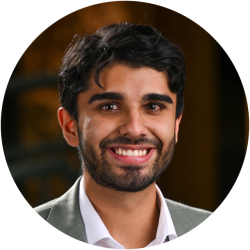 Sooraj Banger, Prince George, B.C., BComm in Management Information Systems and Minor in Computer Science
Sooraj Banger, Prince George, B.C., BComm in Management Information Systems and Minor in Computer Science
Co-op placement: Virtual Care team, Interior Health
“I want to work with businesses to help them obtain new technologies that will help make their operations more efficient. At Interior Health, I am learning new ways that technology can help the health-care system, and more importantly, help patients.
It feels great to be able to apply concepts that I learn in school to the real world. Co-op has provided me with real world experience and helped me find my true passions in my career.”
Finances and scholarships
Visit the Awards Guide to view the hundreds of available scholarships, bursaries, and awards.
Current high school students are encouraged to apply to UNBC by January 15 to be automatically eligible for early-entrance awards and to apply for leadership awards.
- $3,500,000 in financial awards given each year
- 1 in 4 students receive a UNBC financial award
Application deadlines for awards
| Value | Deadline | |
|---|---|---|
| Early-entrance scholarships | $2,500 and $5,500 | January 15 |
| Leadership awards | $3,000 | January 15 |
| President’s Silver Anniversary Awards for Excellence in Leadership | $6,000 (renewable at $5,500 for up to three additional consecutive years) | January 15 |
| General scholarships, bursaries, and awards | Varied; up to $25,000 | April 1 |
Approximate costs per academic year
(30 credit hours, 10 courses)
| Domestic student | International student | |
|---|---|---|
| Tuition* | $5,755 | $23,820 |
| Student fees* | $1,010 | $1,390 |
| Books* | $1,650 | $1,650 |
*Cost of tuition, fees and books are subject to change and vary between programs.
Cost of living per academic year
| On-campus living expense (does not include fees or damage deposit) | $5,205 |
| On-campus 7-Day Meal Plan | $5,510 |
| On-campus 5-Day Meal Plan (Monday to Friday) | $4,920 |
| Off-campus housing (approximate) | $9,000* |
*Average rental cost of 1-bedroom housing for eight months in Prince George, B.C.
Domestic tuition costs
Based on average tuition amounts per year of a standard four-year degree (minimum 30 credits per year / maximum 36 credits per year).
| Minimum tuition | Maximum tuition | |
|---|---|---|
| UNBC | $5,755 | $6,910 |
| SFU | $6,115 | $7,335 |
| UVic | $6,045 | $7,450 |
| UBC-O | $5,730 | $7,625 |
| UBC | $5,730 | $7,625 |
International tuition costs
Based on average tuition amounts per year of a standard four-year degree (minimum 30 credits per year / maximum 36 credits per year).
| Minimum tuition | Maximum tuition | |
|---|---|---|
| UNBC | $23,820 | $28,580 |
| SFU | $27,895 | $33,475 |
| UVic | $27,835 | $31,450 |
| UBC-O | $42,800 | $55,170 |
| UBC | $40,515 | $55,860 |
Annual tuition costs are compared to other B.C. research universities, accounting for first-, second-, third-, and fourth-year tuition amounts. Minimum and maximum tuition costs depend on factors such as total credit count per year and any program fee differentials applied.
Your fees include many benefits
Health and dental coverage
If students do not have existing Canadian medical and dental coverage, student fees include a plan to ensure access to these services during study.
Fitness centre membership
Students have access to the world-class, on-campus Northern Sport Centre during their studies.
Intramural athletics registration
Students can join any, or all, intramural sports leagues.
UPASS
Through the UPASS, UNBC students gain access to the following:
- Two municipal swimming pools.
- Prince George’s Transit System, which takes students to and from campus seven days a week.
- Third-party benefits and perks for university students such as discounts on food, shopping, internet, television, and more!
Former Youth in Care Provincial Tuition Waiver Program
If you are a resident of British Columbia and between the ages of 19 - 26 and meet the eligibility criteria, you may qualify for free tuition at UNBC.
Become a UNBC Student
Contact us: futurestudents@unbc.ca
1) Explore
Begin by exploring our program information, admission requirements, fees, and deadlines. Then find out more about student life, see our beautiful campus, and join the UNBC community on social media.
2) Sign up
Create an account for personalized emails about your programs of interest, insider tips and hints, faculty information, student life, and so much more!
3) Apply
Apply for admission; applications are submitted through EducationPlannerBC. Apply for housing and scholarships through the UNBC Experience portal.
4) Submit
Email your unofficial documents to admissions@unbc.ca.
Mail any and all official, sealed transcripts to:
University of Northern British Columbia
Undergraduate Admissions
3333 University Way
Prince George, B.C.
V2N 4Z9
B.C. students
Authorize the automatic digital submission of your official secondary school transcripts using the Student Transcript Service.
5) Accept
Wait for your acceptance letter in the mail. Once accepted, (congratulations!) we will email you registration tips, orientation information, and schedules for upcoming activities and events.
6) Don’t forget to register!
Now that you’ve been accepted, let’s make it official. Course registration at UNBC is available on a first-come, first-served basis. Register early for both September and January for the best selection! Once you have registered you will receive your invite to Orientation, and access to information about University events and future-student updates.
Leaders of tomorrow
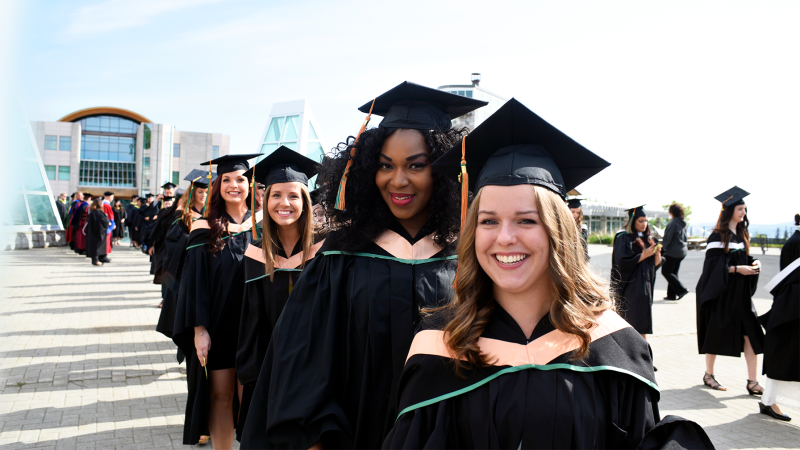
The UNBC experience is unparalleled and prepares students for successful careers. Alumni become leaders across the globe and make the world a better place. Each of our graduates’ stories of success builds the reputation and promise of a UNBC degree. We invite them to stay connected with us and proudly share the highlights of their journeys.
What makes UNBC unique? When our graduates reflect on their experience, they tell us that the access to professors, research opportunities, interdisciplinary learning, and interaction with small cohorts creates a community of support that leads to their success.
Our graduates tell us that UNBC helped them become better critical thinkers, improved their ability to acquire skills and knowledge, provided them with a comprehensive knowledge of their chosen subject area, and enhanced their problem-solving skills.
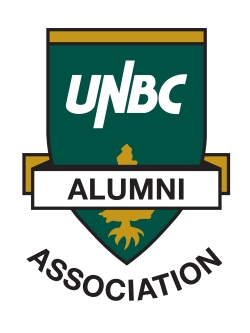 What our alumni are saying
What our alumni are saying
- 89% say the knowledge and skills gained are useful in performing their job
- 81% work in fields related to their program
- 85% are satisfied with their job
- 69% are in management
- 93% are satisfied with their UNBC experience
- 84% are employed within 6 months of graduating
- 80% are recommending UNBC to others
- 89% said the quality of instruction was very good or good
Contact us at alumni@unbc.ca if you’d like to connect with a graduate of UNBC.
Experience UNBC
Virtual or in-person, there are so many ways to explore UNBC!
General undergraduate information sessions
- September 27
- October 13
- November 15
Transferring to UNBC information sessions
- October 12
- November 1
Awards and Financial Aid information sessions
- November 8
- November 22
- December 13
Information sessions for Indigenous future students
- October 18
- November 9
Find UNBC Student Recruitment Officers at the following university/education fair event circuits:
You can also book a guided campus tour or a Student for a Day experience.
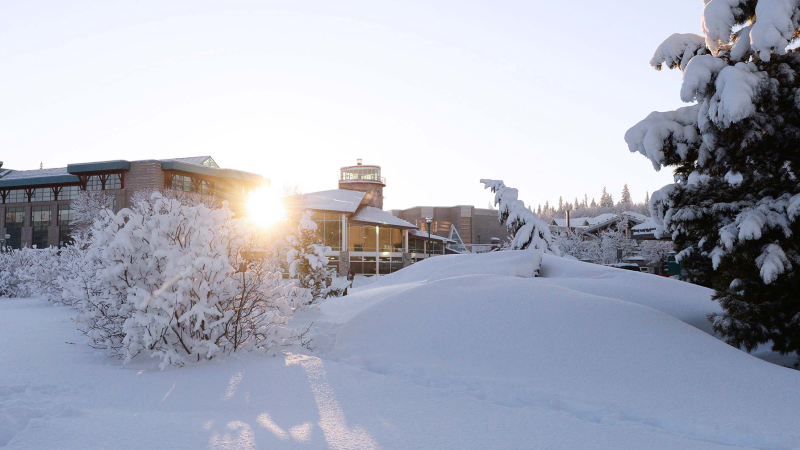
Want UNBC to visit your school? Tell your Counsellor or Indigenous Education Worker to contact us!
Phone: 250-960-6306
Email: futurestudents@unbc.ca
Phone: 250-960-5858
Email: ie@unbc.ca
Prince George campus contact information
3333 University Way
Prince George, B.C.
V2N 4Z9
Phone: 250-960-5555
Toll-free: 1-800-627-9931
Email: futurestudents@unbc.ca
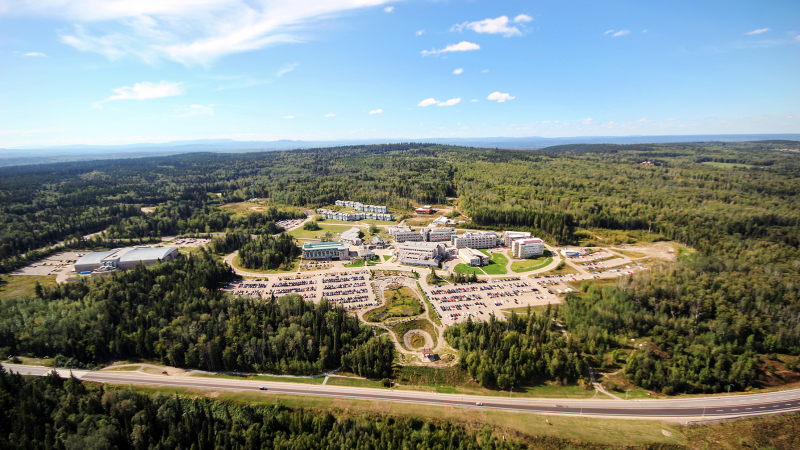
Regional campuses contact information
South-Central campus
S100-100 Campus Way
Quesnel, B.C.
V2J 7K1
Phone: 250-991-7540
Toll-free: 1-800-627-9931
Email: south-central@unbc.ca
Peace River-Liard campus
Box 1000, 9820-120th Ave
Fort St. John, B.C.
V1J 6K1
Phone: 250-787-6220
Toll-free: 1-800-935-2270
Email: northeast@unbc.ca
Northwest campus
4837 Keith Avenue
Terrace, B.C.
V8G 1K7
Phone: 250-615-5578
Toll-free: 1-800-697-7388
Email: northwest@unbc.ca
Wilp Wilxo’oskwhl Nisga’a Institute
PO Box 70
3001 Ts’oohl Ts’ap Avenue
Gitwinksihlkw, B.C.
V0J 3T0
Phone: 250-633-2292
Toll-free: 1-800-980-8838
University lingo
Wondering about the difference between a bursary and a scholarship? Or what syllabus means? Check out our Key Terms and Language for a full list of definitions.

